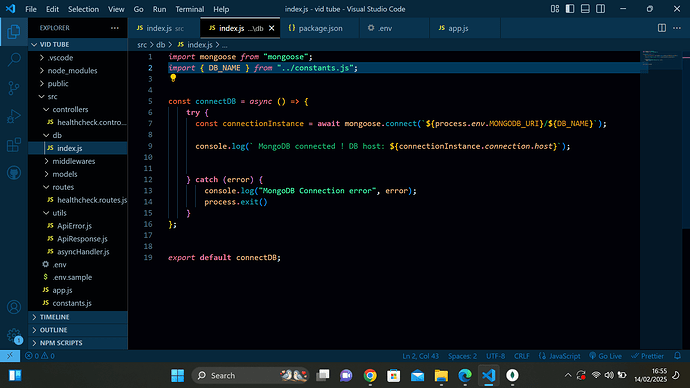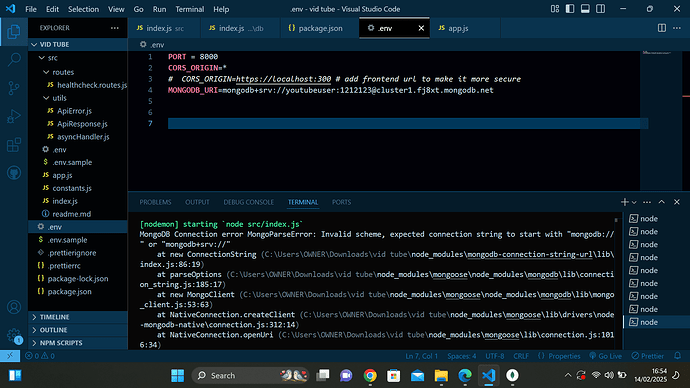Hello, today we upgraded from mongodb driver nodejs (2.1 to 3.7).
Sadly we got this error MongoParseError: URI malformed, cannot be parsed.
I tried many things.
Could you help us given this piece of code please?
'use strict';
var http = require('http');
var express = require('express');
var bodyParser = require('body-parser');
var swaggerize = require('swaggerize-express');
var path = require('path');
var fs = require('fs.extra');
var cors = require('cors');
var request = require('request-json');
var i18n = require('i18n-future').middleware();
var locale = require("locale");
var ejwt = require('express-jwt');
var gm = require("gm").subClass({
imageMagick: true
});
var formidable = require('formidable');
var stream = require('readable-stream');
var uuid = require('node-uuid');
var UploadedFile = require(__dirname + '/models/uploadedfile.js');
var Error = require(__dirname + '/models/error.js');
var mongodb = require('mongodb'),
MongoClient = mongodb.MongoClient;
var sharedData = module.exports.sharedData = {
credentials: {}
};
if (fs.existsSync(__dirname + '/env.json')) {
var env = JSON.parse(fs.readFileSync(__dirname + '/env.json'));
for (var key in env) {
if (!process.env[key]) {
process.env[key] = env[key];
}
}
}
sharedData.credentials.sendgridOption = {
auth: {
// api_user: process.env.SENDGRID_USERNAME,
api_key: process.env.SENDGRID_PASSWORD
}
};
var tools = sharedData.tools = require('./tools.js');
var emailer = sharedData.emailer = require(__dirname + '/emailer/index.js');
var statics = sharedData.statics = require(__dirname + '/statics/index.js');
var cronJobs = require(__dirname + '/cronJobs.js');
// Start Express
var app = express();
var server = http.createServer(app);
// ########################
// # Defining middlewares #
// ########################
// CORS
app.use(cors());
// Provide swagger access on /api route
app.use('/', function (req, res, next) {
// Mobile redirection
// var MobileDetect = require('mobile-detect');
// if (req.headers && req.headers['user-agent'] && req.path === '/') {
// var md = new MobileDetect(req.headers['user-agent']);
// if (md.phone()) {
// return res.redirect('/mobile');
// }
// }
next();
});
app.use('/api', express.static(__dirname + '/public/swagger'));
app.use('/api/files', function (req, res, next) {
var path = req.path;
if (req.path.substr(0, 1) !== '/') {
path = '/' + path;
}
res.redirect(process.env.GDM_FILES_ENDPOINT + path);
});
app.use('/config/swagger.json', express.static(__dirname + '/config/swagger.json'));
// JWT Token
app.use(ejwt({
secret: process.env.JWT_SECRET
}).unless({
path: [
'/favicon.ico',
'/api/sitemap.xml',
'/api/ping',
'/api/register/mobile',
'/api/register/web',
'/api/auth/mobile',
'/api/auth/web',
'/api/auth/regenerate',
'/api/admin',
'/api/public',
'/api/devis',
/^\/api\/mobile\/.*/,
/^\/api\/admin\/.*/,
/^\/api\/public\/.*/,
/^\/api\/devis\/.*/
]
}));
// i18n
app.use(i18n);
// Middleware to get the local of users
app.use(locale(['en', 'en_US', 'fr', 'fr_FR']));
// Url encoded
app.use(bodyParser.urlencoded({
extended: true
}));
// JSON Body parser
app.use(bodyParser.json());
app.post('/api/file', function (req, res) {
var form;
form = new formidable.IncomingForm();
form.onPart = function (part) {
var outStream, path = '';
if (part.filename == null) {
return form.handlePart(part);
}
outStream = new stream.PassThrough();
part.on('data', function (buffer) {
form.pause();
return outStream.write(buffer, function () {
return form.resume();
});
});
part.on('end', function () {
form.pause();
return outStream.end(function () {
return form.resume();
});
});
// Generate time-based filename;
var uploadedFile = new UploadedFile({
originalFileName: part.filename,
filename: uuid.v1() + '.' + part.filename.split('.').pop()
});
if (req.get('fileName')) {
uploadedFile.filename = req.get('fileName');
}
if (req.get('path')) {
if (req.get('path').charAt(0) !== '/') {
path += '/';
}
path += req.get('path');
} else {
path += '/';
}
path += uploadedFile.filename;
console.log("received part: " + part.filename + ", uploading to OVH at: " + path);
outStream.pipe(sharedData.tools.uploadFile(path, function (success, data) {
console.log(success, data)
if (success === false) {
var error = new Error();
error.code = 400;
error.message = req.translate('error.unexpected');
error.data = data;
res.status(error.code).send(error);
return;
}
return res.jsonp(uploadedFile);
}));
};
form.on('error', function (err) {
console.log(err);
var error = new Error();
error.code = 400;
error.message = req.translate('error.unexpected');
error.data = err;
res.status(error.code).send(error);
});
form.on('end', function () {
console.log('form end');
});
form.parse(req);
});
// Connect to MONGO DB
MongoClient.connect(process.env.MONGODB_URL, {
mongos: {
ssl: true,
sslValidate: false,
poolSize: 2,
"socketOptions": {
"keepAlive": 120
}
},
"server": {
"socketOptions": {
"autoReconnect": true,
"keepAlive": 120
}
}
},
function (err, db) {
if (err) {
console.log(err);
} else {
sharedData.mongo = {
db: db,
oid: mongodb.ObjectID
};
// Create this object for compatibility with old api
sharedData.manager = {
app: app,
server: server
};
require('./handlers/manager/server.js');
// Initialize routes with swagger document
app.use(swaggerize({
api: path.resolve('./config/swagger.json'),
handlers: path.resolve('./handlers')
}));
server.listen(process.env.PORT || 8022, function () {
console.log((new Date()) + " > Server ready to accept requests on port " + (process.env.PORT || 8022));
// start cronJobs
cronJobs.init();
});
}
}
);
and here is how is formatted my connection string in the env.json file :
“MONGODB_URL”:“mongodb+srv://:@sl-eu-lon-2-portal.1.dblayer.com:10096/gdm?ssl=true&retryWrites=true&w=majority”

